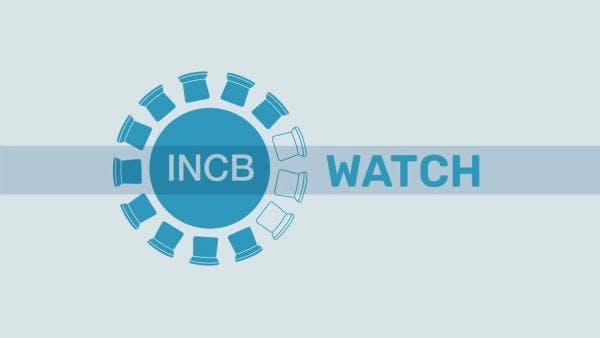INCB
The INCB at the 62nd session of the Commission on Narcotic Drugs (CND)
The INCB had a busy time at the 62nd session of the Commission on Narcotic Drugs and its Ministerial Segment, held in March 2019. INCB President, Dr Viroj Sumyai, spoke at the Ministerial Segment, underscoring the importance of complying with human rights norms in the implementation of the drug control conventions, in addition to improving access to controlled drugs for medical and scientific purposes. He also referred to the sustainable development goals (SDGs) and their links to drug control.
In his presentation, Dr Sumyai further discussed the invocation of Article 14 of the Single Convention in relation to Afghanistan – specifically the use of Article 14 bis, which allows member states to provide (financial and other) support to ensure treaty compliance. IDPC has, in the past, argued for the Board to invoke 14bis in relevant situations.
On a less positive note, however, the INCB President went on to say to assembled delegates that:
‘The legislative developments concerning the “recreational” use of cannabis are a real concern not least for their potential impact on health, particularly of youth, but also because they are contrary to your treaties and the commitments you made to one another’.
The Russian Federation had proposed a resolution supporting the treaty mandated functions of the INCB; given the extensive Russian attacks on Canada for legally regulating the non-medical us of cannabis, it was clear that the motive underlying this resolution was to support the Board in taking action under the international drug control conventions against the Canadian government.
The Board was also engaged in the now-familiar ‘informal dialogue’ with CSOs. On the topic of transparency, Dr Sumyai blamed the INCB’s lack of such on the Conventions and the need for confidentiality in dealings with member states. Further on, when asked about its position on the USA and states’ legalisation of nonmedical cannabis use, Dr Sumyai gave a very strange response, comparing the situation to that pertaining in a family:
‘The situation is like when you have a big family. The US has 51 sons, 51 states. You have 10 stubborn ones. What are you going to do with your sons? The federal government must impose some measures on the stubborn child. The federal government does it already’.
The President added that the INCB was in dialogue with the USA regarding this situation but gave no answer as to why the Board’s response to the USA is so radically different from the actions it has taken in respect of Canada or Uruguay.
Finally, the INCB presented its Annual Report at CND, which contains a further attack on the nonmedical use of cannabis, in both the Foreword and Chapter 1. These texts also state that ‘poorly regulated’ medical cannabis regimes contribute to the legalisation of nonmedical or recreational use of cannabis, which challenges public health, young people, the Conventions and member states. Earlier in March, IDPC issued a press release criticising the INCB’s uncooperative attitude towards cannabis reform as reflected in its Annual Report.
Topics
Regions
Related Profiles
- International Narcotics Control Board (INCB)
